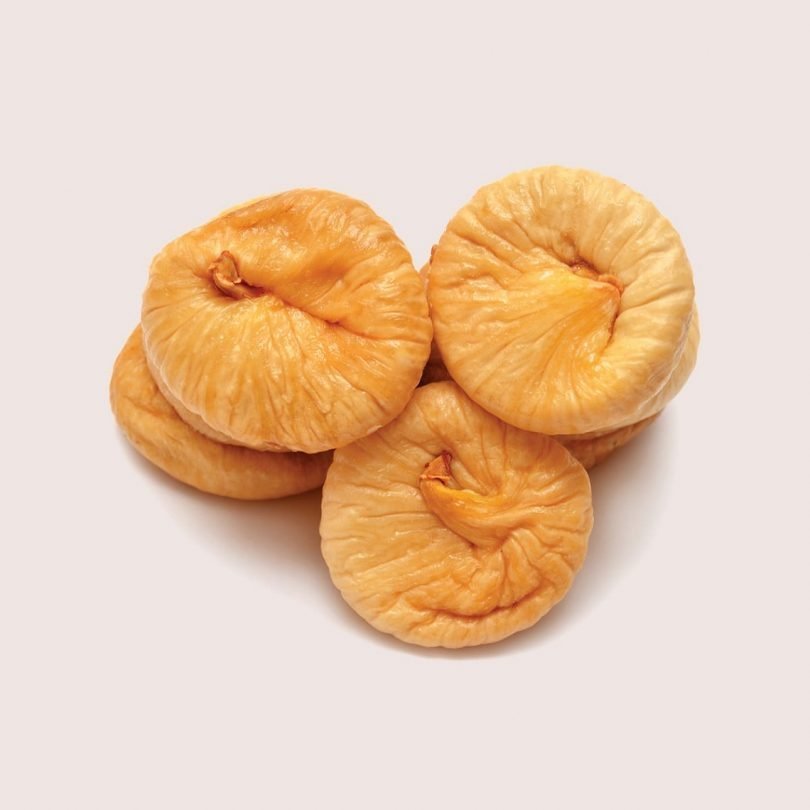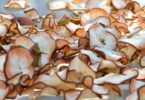Find out what the main health benefits of dried figs are!
Dried fruit is fruit with most of its water content taken away through various drying methods. These methods shrink the fruit, leaving it smaller, but dense in energy. The most common type of fruit used for drying are raisins, followed by dates, prunes, figs, and apricots.
READ ALSO: Drying Figs: 3 Ways To Dry and Preserve Figs At Home
Nutrition Facts & Health Benefits of Dried Figs
Figs are known to be a powerhouse of nutrition, bursting with large amounts of vitamins C and K, phosphorus, potassium, calcium, magnesium, fiber, and powerful antioxidants. This naturally sweet fruit supports health and may even aid in weight loss, despite having a high sugar content.
Dried figs nutrition facts
Dried figs contain less water. This makes their calorie, sugar, and nutrient content more concentrated than their fresh counterpart. One cup, approximately 149 grams, provides you with:
- 38 percent of the DV (daily value) of manganese
- 3 percent of the DV of vitamin C
- 29 percent of the DV of vitamin K
- 9-12 percent of the DV of vitamin A
- 29 percent of the DV of potassium
- 25 percent of the DV of magnesium
- 24 percent of the DV of calcium
- 95.2 grams of carbs
- 14.6 grams of fiber
- 4.9 grams of protein
- 1.4 grams of fat
- 71.4 grams of sugars
- 371 calories
On the other hand, the same amount of fresh figs contains 1.2 grams of protein, 28.8 grams of carbs, 0.3 gram of fat, 4.2g fiber, 24.3 grams of sugars, and about 111 calories. Fresh figs may have lower levels of vitamins and minerals in comparison to dried ones, but they’ve got fewer amounts of calories and carbs.
Health benefits of dried figs
Weight loss
Dried figs may help in weight loss when consumed in moderation. The fiber in figs curbs hunger. This helps reduce food intake. High-fiber diets not only promote weight loss, but they also protect against heart diseases.
If you’re trying to lose weight but struggle with snack cravings throughout the day, consider having dried fruit on hand. Dried figs are naturally sweet. Because there are no added sugars, it makes them a healthy alternative to processed snacks like milk chocolate or cookies. Eating these fruits also replenishes your body’s glycogen levels, helping your muscles recover after a workout session.
Improving digestion
The rich fiber content of figs benefits your digestive health by bulking and softening your stool, preventing constipation. Eating more fiber may also help you avoid bowel-related issues like hemorrhoids.
Fighting diabetes
Despite having a high sugar content, dried figs may help manage diabetes. In addition to being high in vitamin E, several fig varieties may also improve insulin response and reduce blood glucose levels.
Adding dried figs to your diet can promote the growth of gut bacteria that produce healthy fats that, in turn, regulate appetite and help make diabetes more manageable.
Bone health
A half-cup of dried figs gives you about 121 milligrams of calcium, which is around 12 percent of your recommended daily intake. Due to their naturally high levels of calcium, potassium, phosphorus, and magnesium, figs may even help prevent osteoporosis.
Heart health
Half a cup of dried figs, which contains less than 200 calories, contains about 7 grams of dietary fiber. Depending on your age and sex, that amount lies somewhere between 20 to 30 percent of your recommended daily fiber intake. The rich antioxidant content found in dried figs also eliminates free radicals that can damage blood vessels.
Fiber not only makes your bowel movement regular, but it also promotes healthy blood cholesterol and sugar levels.
Nerve and muscle health
Potassium, a mineral that dried figs are packed with, is essential for nerve function and muscle contraction. It also counterbalances the sodium in your body and keeps your blood pressure in check. Half a cup of figs has about 500 mg of potassium, which is around 10 percent of your recommended intake.
The calcium in dried figs isn’t only for bone health. Calcium also plays a huge role in nerve and muscle function. Higher calcium intake may even lower rates of colorectal cancer.
Healthy skin and hair
If you’re looking to have soft, supple skin and strong, shiny hair, include figs in your diet. Dried figs are bursting with antioxidants and micronutrients that improve skin health and strengthen hair. Figs are also rich in vitamin A, which keeps your skin healthy.
Dried figs are an excellent source of compounds that protect against oxidative damage, a major factor to chronic diseases and aging. Figs also have antimicrobial properties, which can strengthen your natural defenses and help prevent skin infections. The zinc and iron in dried figs also reduce hair loss and promote hair growth.
Stronger immune system
Dried figs are an excellent source of vitamin A. Your body needs vitamin A to produce new blood cells, including white blood cells that are crucial to your immune system.
Pre-packaged dried figs are readily available in most stores, but be careful! Make sure to read the packaging before going for them. Most processed dried fruit contain added sugars. Dried figs are naturally very sweet, so you really don’t need the extra sugar. Added sugar is shown to have harmful effects on health, like increasing the risk of obesity and heart disease.
If you would like to make sure that the fruit you’re consuming does not contain any extra sweeteners, you can dry your own figs at home. Figs can be dried in ovens, over stoves, in food dehydrators, and even under the sun. Dried figs can have a shelf-life of 6 – 12 months when stored in the pantry or refrigerator. Frozen, dried figs can last for 12 – 18 months.
You can eat dried figs as is as a snack, mix it in salads, blend in smoothies, or even use as a sweetener. Dried figs are a convenient, hardy and versatile superfood that you can enjoy everywhere.
READ ALSO: Health Benefits of Dried Fruits: More Than Just A Yummy Snack





